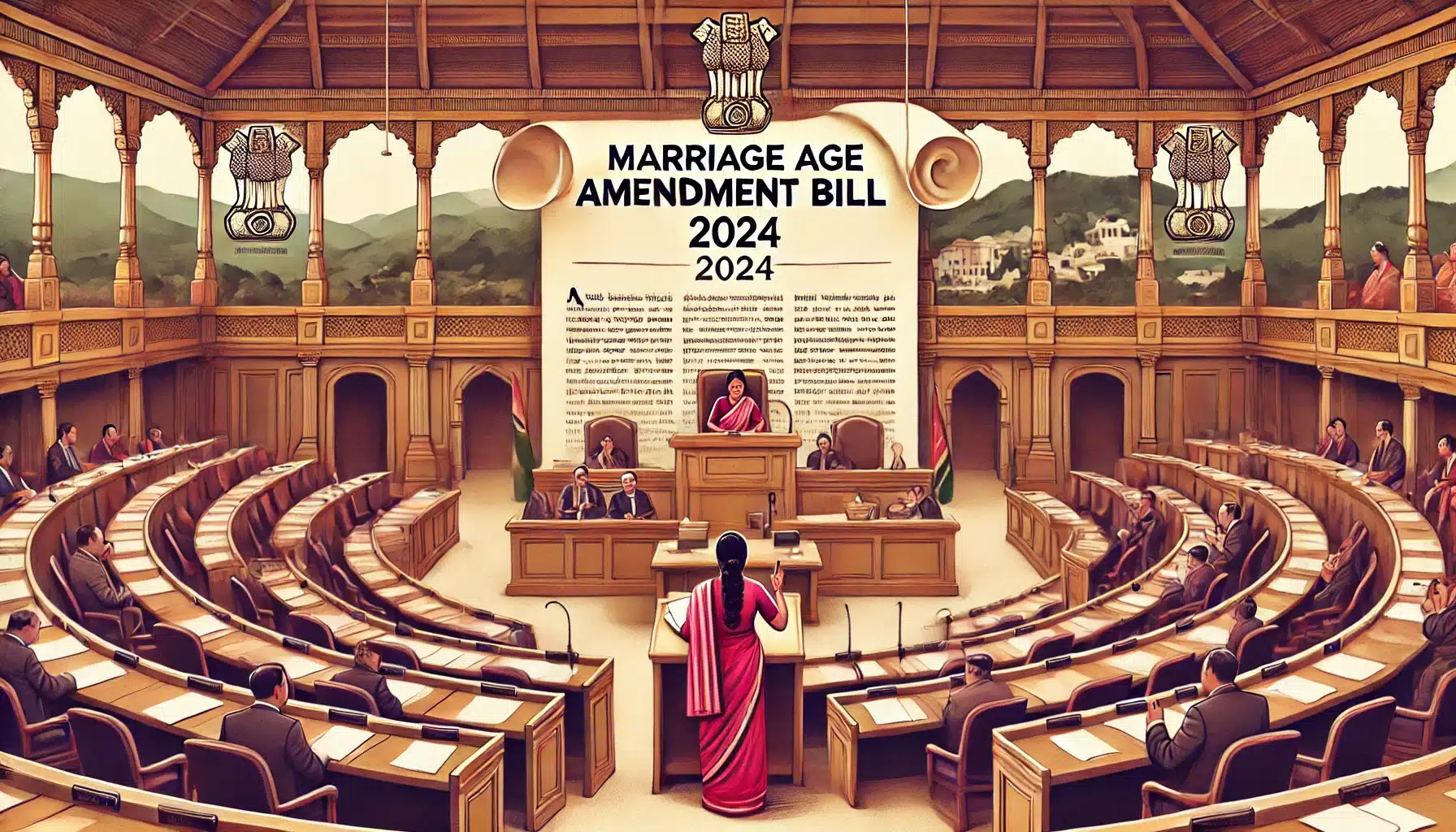Himachal Pradesh has taken a significant step towards gender equality by passing the Prohibition of Child Marriage (Himachal Pradesh Amendment) Bill, 2024. This amendment raises the minimum marriage age for women from 18 to 21 years, aligning it with the age for men. The Bill also amends the Prohibi

The Himachal Pradesh Legislative Assembly has recently approved a landmark legislative change with the passage of the Prohibition of Child Marriage (Himachal Pradesh Amendment) Bill, 2024. This Bill, a significant stride towards gender equality, seeks to raise the minimum age of marriage for women from 18 to 21 years. The Bill is an amendment to the Prohibition of Child Marriage (PCM) Act, 2006, originally enacted by Parliament. The proposed legislation has sparked extensive debates, focusing on various social, economic, and health-related factors that justify this change.
Reasons cited for increasing the Minimum Age for Marriage:
- Gender Equality and Education:
- Higher Education: Raising the minimum age of marriage for women to 21 years allows them more time to complete their education, thereby enhancing their career prospects.
- Empowerment: Delaying marriage provides women with additional time to develop skills and achieve financial independence, fostering empowerment.
- Health and Well-being:
- Maternal Health: Early marriage often results in early pregnancies, which carry higher risks of maternal and infant mortality. By raising the marriage age, women can attain the necessary physical and emotional maturity for safer pregnancies, improving health outcomes for both mothers and children.
- Child Development: Delayed motherhood enables women to be better prepared, both emotionally and economically, to provide optimal care for their children.
- Reducing Child Marriage:
- Combatting Child Marriage: Child marriage persists in some regions of India, contributing to social issues such as domestic violence, lack of education, and poverty. The Bill aims to address these challenges by raising the marriage age.
- Combatting Child Marriage: Child marriage persists in some regions of India, contributing to social issues such as domestic violence, lack of education, and poverty. The Bill aims to address these challenges by raising the marriage age.
- Economic Development:
- Workforce Participation: Postponing marriage can increase women’s participation in the workforce, which in turn contributes to economic development.
Key Challenges:
- Different Ages for Majority and Marriage:
- The Bill elevates the minimum marriage age for females to 21 years, making it consistent with that for males. However, under the Majority Act, 1875, the age of attaining majority remains at 18 years. This discrepancy could have implications regarding the rights and responsibilities of individuals between 18 and 21 years of age.
- The Bill elevates the minimum marriage age for females to 21 years, making it consistent with that for males. However, under the Majority Act, 1875, the age of attaining majority remains at 18 years. This discrepancy could have implications regarding the rights and responsibilities of individuals between 18 and 21 years of age.
- Inconsistencies with Supreme Court Judgments:
- The Supreme Court has recognized the right to marry as an integral part of the right to life under Article 21 of the Constitution.
Additionally, the Court has ruled that the choice of life partner by two consenting adults is protected under Articles 19 and 21. By restricting the right to marry before the age of 21 years, the Bill raises questions about the reasonableness of such restrictions for those aged 18 to 21.
- The Supreme Court has recognized the right to marry as an integral part of the right to life under Article 21 of the Constitution.
- Implementation Challenges:
- Limited Success in Enforcing the 2006 Act: Despite the Prohibition of Child Marriage Act, 2006, enforcement remains weak, as evidenced by only 785 cases being registered under the Act in 2020. This raises concerns about whether the increase in the minimum marriage age will significantly reduce child marriages.
Himachal Pradesh’s Legislative Initiative:
- The Himachal Pradesh Bill amends the Prohibition of Child Marriage (PCM) Act by raising the minimum marriage age for both males and females to 21 years, thereby eliminating the previous gender-based distinction.
- The Bill defines a “child” as anyone under 21 years of age, irrespective of gender, and grants this new age limit overriding authority over any other law or cultural practice that might allow earlier marriage.
- It also extends the time frame for filing a petition to annul a child marriage, allowing individuals to do so within five years of reaching the age of majority, giving them until the age of 23 to annul the marriage.
Legislative Process and Constitutional Implications:
- The Himachal Pradesh Bill, by raising the minimum marriage age for women to 21 years, directly conflicts with the central law, which sets the minimum age at 18 years.
- Marriage being a subject under the Concurrent List, both the central and state governments can legislate on it. However, when a state law contradicts a central law, Article 254(1) of the Constitution renders the conflicting part of the state law void, unless the President gives assent under Article 254(2).
- Therefore, the Bill must be reserved for the President’s consideration by the Governor of Himachal Pradesh. The President’s assent is essential for the Bill to become law, similar to the process seen with Uttarakhand’s Uniform Civil Code (UCC) Bill.
Click to Read: Prohibition of Child Marriage (Himachal Pradesh Amendment) Bill, 2024





